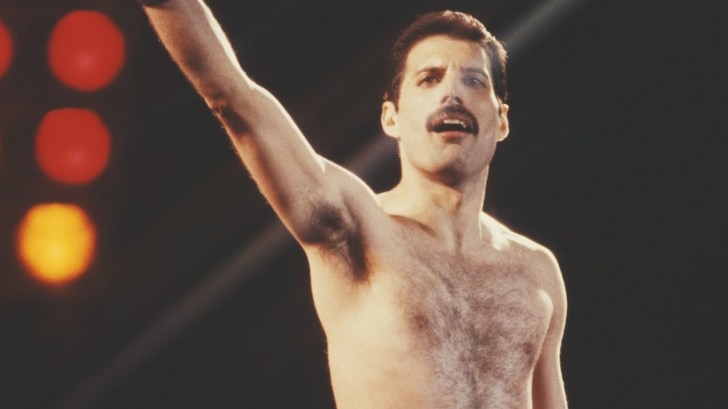Queen’s music has resonated with audiences worldwide for decades, with their arena-smashing hits and radio-bopping epics. The band’s original frontman, Freddie Mercury, was the heart and soul behind their enduring success. While the 2018 biographical film “Bohemian Rhapsody” provided a glimpse into Freddie’s life, there’s a wealth of untold stories that shed light on the man behind the music.
From Farrokh to Freddie
Freddie Mercury, the flamboyant showman of Queen, didn’t always go by that name. Born as Farrokh Bulsara on September 5th, 1946, he hailed from Zanzibar, with parents of Persian descent. His early years were far from the rock ‘n’ roll lifestyle he later embraced. His father worked as a cashier in the British Colonial Office, and a conservative upbringing defined his early life.
Young Farrokh’s journey took a turn when he was sent to study in Mumbai, where his love for music, especially the piano, blossomed. He formed his first band, The Hectics, at a young age, playing rock ‘n’ roll covers.
View this post on Instagram
A Move to Middlesex
After completing his studies in Mumbai, Freddie and his family fled to Middlesex, England, to escape the Zanzibar Revolution. Freddie pursued a diploma in graphic art and design after studying art in West London. His journey eventually led him to a job at Heathrow Airport as a baggage handler, all while immersing himself in London’s live music scene.
The Emergence of a Legend
It was fate that led Freddie to meet guitarist Brian May and drummer Roger Taylor at an underground concert in London. He was instantly drawn to their band, Smile, and a chance encounter changed the course of music history. Freddie joined Smile (which later became Queen), declaring, “I’m not going to be a pop star; I’m going to be a legend!” His powerful vocals and extraordinary stage presence left no doubt about his destiny.
The Four-Octave King of Queen
Freddie’s vocal prowess was unmatched, boasting a four-octave vocal range that electrified audiences. His singing was a defining feature of Queen’s music, setting them apart from their contemporaries. His ability to captivate even the most conservative of listeners with his flamboyant performances was a testament to his talent and charisma.
View this post on Instagram
Queen’s Musical Revolution
Queen’s music was a unique blend of rock and progressive elements, setting them apart from their peers. They experimented with new recording techniques, effects, and elaborate stage performances, establishing themselves as musical trailblazers. Their name, Queen, evoked a sense of regal splendor, fitting for a band that would conquer the world.
Behind the Stage
While Freddie was the face of the band, each member of Queen possessed exceptional talents. Brian May held a degree in physics, eventually earning a Ph.D. in physics and astronomy. Roger Taylor initially studied medicine before switching to dentistry, while John Deacon studied electronics. Their combined brilliance contributed to Queen’s success.
The Iconic Queen Logo
Freddie’s artistic sensibility extended to the band’s logo. The crest featured animals representing each member’s zodiac sign, embodying the unity and individuality of the band.
View this post on Instagram
The Long Road to Success
Queen’s journey to fame was not without its challenges. Their first album didn’t gain immediate recognition, but they persevered, releasing “Queen II,” which propelled them to stardom in the UK.
A Near Miss in the USA
In 1974, Queen had the opportunity to tour the USA with Mott the Hoople, a potential breakthrough into international markets. However, Brian May’s illness forced them to return home, narrowly missing their big break.
Under New Management
Facing financial difficulties, Freddie and the band turned to John Reid, Elton John’s manager, for assistance. With their finances sorted and a visionary manager on board, Queen was ready for stardom.
The Unconventional “Bohemian Rhapsody”
Queen’s magnum opus, “Bohemian Rhapsody,” defied convention. Its unique structure and six-minute duration challenged industry norms, but Freddie insisted on maintaining its integrity. The song’s release propelled Queen to the top of the charts for nine consecutive weeks.
Freddie’s Personal Life
Freddie’s personal life was a complex tapestry. His relationships with Mary Austin and Jim Hutton provided glimpses into his exploration of bisexuality and his unwavering friendship.
View this post on Instagram
Live Aid: A Legendary Performance
Queen’s iconic performance at Live Aid in 1985 remains one of the greatest in rock history. Their electrifying set captured the hearts of millions and showcased Freddie’s unparalleled stage presence.
The Hidden Diagnosis
Behind the scenes, Freddie grappled with a secret: he was diagnosed as HIV positive in 1987. He kept this information private until his passing in 1991. His declining health became evident to the public, but he continued to give his all on stage.
Freddie’s Legacy
Freddie’s impact on music and his enigmatic persona left an indelible mark on the world. His love for cats, Zoroastrian beliefs, and the secrets he held to his final resting place remain part of his enduring legacy.
The Untold Stories of Freddie Mercury
Freddie Mercury’s life was a remarkable journey, filled with music, creativity, and personal growth. While “Bohemian Rhapsody” offered a glimpse into his world, the untold stories reveal a man who defied expectations and became a legend whose influence will continue to resonate for generations to come.

